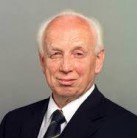Ferenc Mádl
Ferenc Mádl (1931-2011) received his degree from the Faculty of Politics and Law of the Eötvös Loránd University. Between 1978 and 1990, he was the Director of the Institute for Civil Law at ELTE. From 1985, he has been a member of the Harvard Academy of International Commercial Law. He taught at U.C. Berkeley and several European Universities. A Corresponding Member of the Hungarian Academy of Sciences since 1987, and Full Member since 1993. Between 1990 and 1993, he was a Minister without portfolio. Between 1993 and 1994, he was Minister for Culture and Education; between 2000 and 2005 President of the Republic.

